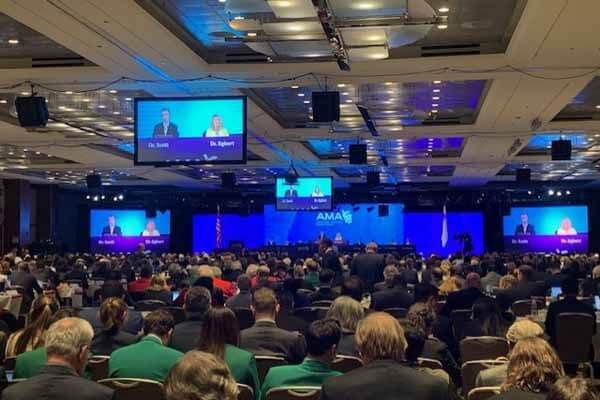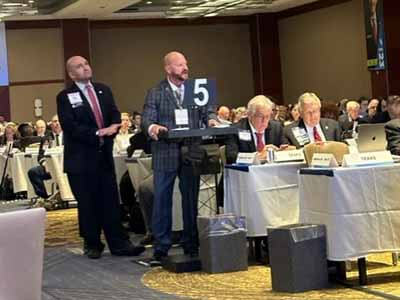
The Texas Delegation to the American Medical Association led the charge for more concrete action to achieve comprehensive Medicare physician payment reform , resulting in new AMA policy calling for less “talk” and more “action” to ensure access to care for patients.
Heeding passionate physician testimony, the AMA House of Delegates voted unanimously at its Annual Meeting in Chicago to adopt new policy language – largely informed by a TMA-authored resolution – directing the national association to take more tangible steps toward making reform a reality.
In addition to declaring Medicare physician payment reform "an urgent advocacy and legislative priority for our AMA,” the resolution directs AMA to:
- Prioritize “significant increases” in federal and state advocacy budgets; and
- Implement a comprehensive advocacy campaign, including a sustained media strategy engaging physicians and patients.
With a lack of payment updates to keep up with inflation imperiling practice viability and access to care – and physicians’ frustrations intense and palpable – a centerpiece of the policy’s reform effort is ensuring physician payments are updated annually at least equal to the annual percentage increase in the Medicare Economic Index (MEI).
AMA also must report back on its progress at each annual and interim meeting of the house “until predictable, sustainable, fair physician payment is achieved,” the policy states.
“I will tell you that everyone who stood up – from medical students to retired physicians to state and specialty societies – was at the ‘pro’ microphone,” in favor of the emboldened effort, TMA President-Elect Ray Callas, MD, told Texas Medicine Today. He is a member of the Texas delegation and chair of its work group that brought the TMA resolution to the AMA house.
“[There] was resounding, resounding respect [for the TMA resolution] in the [AMA] reference committee” that considered it, he said.

The Texas delegation played a pivotal role, Dr. Callas adds, in working with other large state medical associations – including Florida’s and Pennsylvania’s – to educate delegates and to whip up support. The Texas delegation also helped ensure TMA’s resolution language – specifically for urgency, funding, media attention, and progress reports – was incorporated into the final AMA policy.
“What we want are results,” he said. “We are not going to let AMA just blow hot air.”
This hard work paid off with the AMA House of Delegates’ June 12 vote, which earned cheers from the audience and kudos from TMA President Rick Snyder, MD, and AMA Immediate Past President Jack Resneck, MD.
“We applaud all physicians and medical students from across the United States who stood with Texas on new policy empowering AMA to take action to ensure all Medicare patients receive timely access to the highest quality health care,” Dr. Snyder said in a statement. “We look forward to working with Congress to achieve our common goal of a stable, sensible Medicare system that results in better access to physician-led care for all Texans.”
Dr. Resneck acknowledges physicians’ ire with the current payment system and the necessity of congressional intervention to fix it.
“Being mad isn’t enough,” he said in a statement. “We will develop a campaign – targeted and grassroots – that will drive home our message.”
Between 2001 and 2023, Medicare physician payments decreased by 26% when adjusted for inflation, whereas Medicare payments to hospitals and other health care facilities generally have kept pace with inflation, according to AMA. Over the same period, the consumer price index for physician services in U.S. cities increased by 65%.
There are signs Congress is hearing medicine’s pleas. The Medicare Payment Advisory Committee (MedPAC), a key congressional advisory panel, recommended for the first time that Congress increase Medicare physician payments based on MEI, albeit by 50%. A bipartisan bill introduced in April would provide annual inflation updates to the Medicare fee schedule based on the full MEI.
In the meantime, David Henkes, MD, a pathologist in San Antonio and chair of the Texas delegation, says the AMA victory underscores the far-reaching impact Texas physicians can have on national policy. But he also laments the delegation’s size, which directly impacts Texas’ influence.
AMA bases its delegate count from each state on AMA membership, with roughly one delegate apportioned for every 1,000 AMA members. TMA is the largest state medical association in the country, with more than 57,000 members, but only about a third as many Texas physicians belong to AMA, which translates to a smaller delegation.
Dr. Henkes says Texas physicians can support Medicare physician payment reform by joining AMA and amplifying the Texas delegation's voice.
“This is just the beginning,” he told TMT. “We are going to engage our state societies with the AMA and continue this push … until we get this fixed.”
For more information, check out TMA’s federal advocacy webpage and AMA’s Fix Medicare Now website, which includes a simple form to contact your federal representatives.